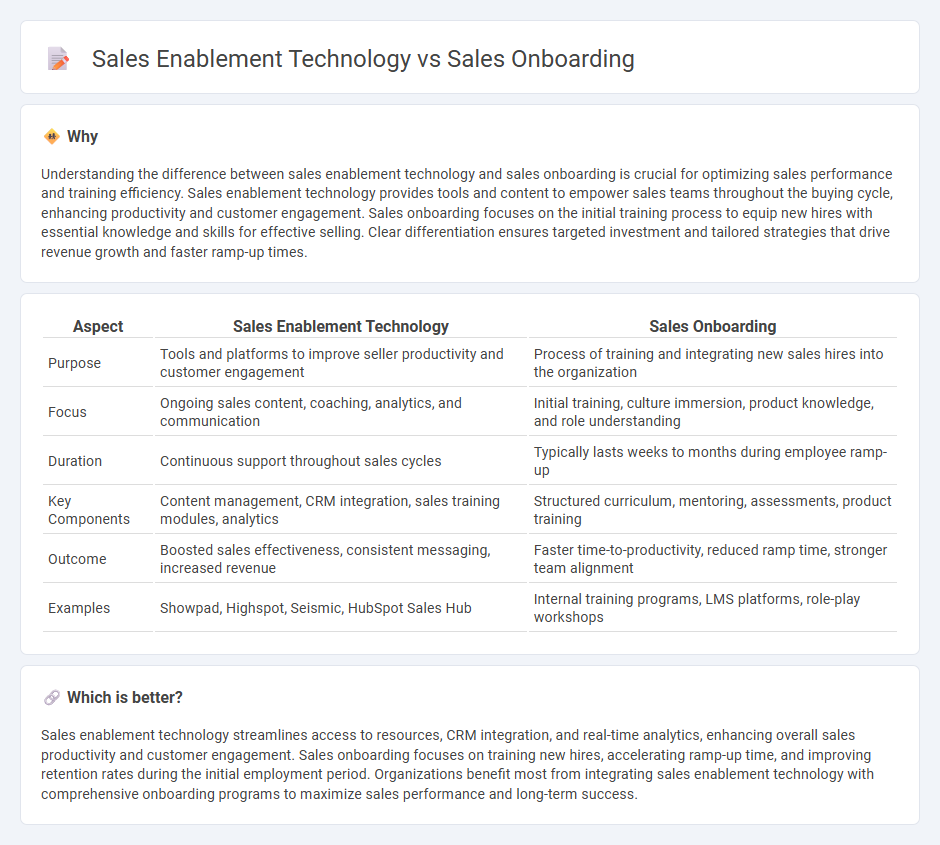
Sales enablement technology streamlines access to resources, training, and analytics, enhancing the efficiency and effectiveness of sales teams. Sales onboarding focuses specifically on integrating new hires by providing targeted training and knowledge to accelerate their productivity. Explore how combining both strategies can transform your sales performance.
Why it is important
Understanding the difference between sales enablement technology and sales onboarding is crucial for optimizing sales performance and training efficiency. Sales enablement technology provides tools and content to empower sales teams throughout the buying cycle, enhancing productivity and customer engagement. Sales onboarding focuses on the initial training process to equip new hires with essential knowledge and skills for effective selling. Clear differentiation ensures targeted investment and tailored strategies that drive revenue growth and faster ramp-up times.
Comparison Table
| Aspect | Sales Enablement Technology | Sales Onboarding |
|---|---|---|
| Purpose | Tools and platforms to improve seller productivity and customer engagement | Process of training and integrating new sales hires into the organization |
| Focus | Ongoing sales content, coaching, analytics, and communication | Initial training, culture immersion, product knowledge, and role understanding |
| Duration | Continuous support throughout sales cycles | Typically lasts weeks to months during employee ramp-up |
| Key Components | Content management, CRM integration, sales training modules, analytics | Structured curriculum, mentoring, assessments, product training |
| Outcome | Boosted sales effectiveness, consistent messaging, increased revenue | Faster time-to-productivity, reduced ramp time, stronger team alignment |
| Examples | Showpad, Highspot, Seismic, HubSpot Sales Hub | Internal training programs, LMS platforms, role-play workshops |
Which is better?
Sales enablement technology streamlines access to resources, CRM integration, and real-time analytics, enhancing overall sales productivity and customer engagement. Sales onboarding focuses on training new hires, accelerating ramp-up time, and improving retention rates during the initial employment period. Organizations benefit most from integrating sales enablement technology with comprehensive onboarding programs to maximize sales performance and long-term success.
Connection
Sales enablement technology streamlines the sales onboarding process by providing new hires with centralized access to training materials, product information, and sales playbooks. Integrating these tools accelerates ramp-up time and improves sales performance by ensuring consistent knowledge transfer and skill development. Effective sales onboarding powered by enablement software enhances team productivity and drives higher revenue growth.
Key Terms
**Sales Onboarding:**
Sales onboarding technology accelerates new sales representatives' productivity by providing structured training modules, real-time coaching, and performance tracking tools tailored to individual learning paces. This technology enhances ramp-up time by integrating role-specific content, quiz assessments, and interactive simulations that reinforce essential skills and company knowledge. Explore how advanced sales onboarding solutions can transform your team's effectiveness and shorten time-to-quota.
Training Program
Sales onboarding focuses on accelerating new hire ramp-up through structured training programs that cover product knowledge, sales processes, and company culture. Sales enablement technology supports ongoing learning by providing resources, content, and tools that enhance salesperson performance and adaptability. Explore how integrating training programs within sales enablement platforms boosts both onboarding efficiency and long-term sales success.
Ramp-up Time
Sales onboarding technology accelerates ramp-up time by providing structured training modules and real-time performance tracking tailored to new hires. Sales enablement technology supports continuous skill development and resource accessibility, enhancing overall team productivity beyond initial onboarding. Explore how integrating both can optimize sales performance and reduce time-to-productivity in your organization.
Source and External Links
How to build an effective sales onboarding program - Mural - Sales onboarding should follow a structured 60-90 day schedule including company values, product overview, CRM training, live-call shadowing, and ongoing coaching to help new reps reach full productivity 37% faster.
How to Build a Sales Onboarding Process for New Hires - An effective sales onboarding process involves crafting clear business goals, delivering hands-on interactive training, and enabling reps to succeed through ongoing measurement and coaching, driving higher retention and sales results.
7 Effective Sales Onboarding Steps & Best Practices | Pipedrive - Key onboarding best practices include setting measurable objectives, using a 30-60-90 day plan with milestones like shadowing calls, making outreach, and closing deals, alongside providing ready-to-use resources for quick ramp-up.
 dowidth.com
dowidth.com